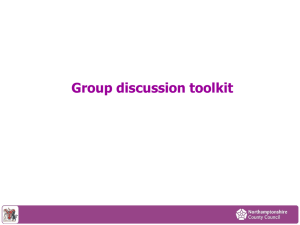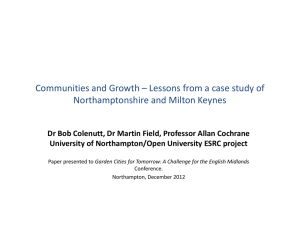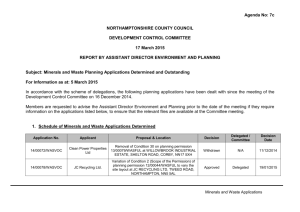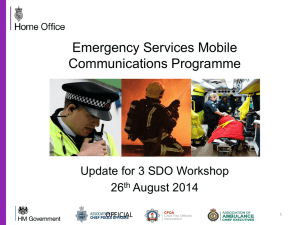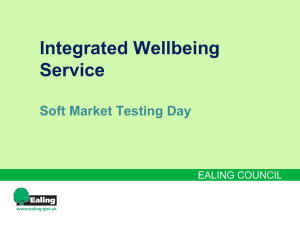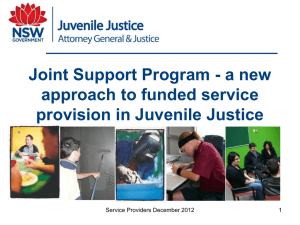Framework for DfE Meeting - Northamptonshire County Council
advertisement
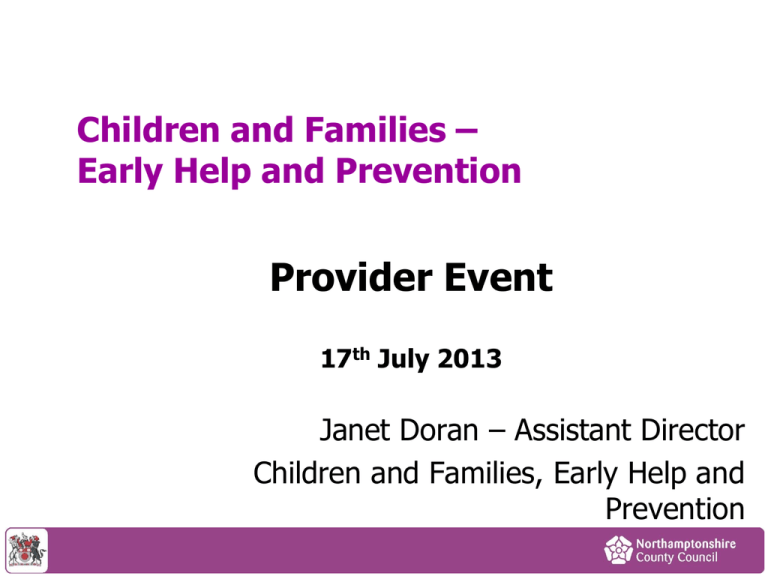
Children and Families – Early Help and Prevention Provider Event 17th July 2013 Janet Doran – Assistant Director Children and Families, Early Help and Prevention Aims of session To inform all interested parties of:• Prevention and Demand Management Strategy journey to date • Early Help and Prevention in Northamptonshire • Commissioning process for Early Help and Prevention Prevention and Demand Management Social Care Staff EH & Prev £ Contracted Services Business Systems Vulnerable individuals/familie s/communities Public Service Bodies Data Performance Information Prevention and Demand Management Current Helping You when you can’t help yourself Future Costs savings generated by reduction in volume (Stock and Flow) Specialist Specialist Targeted Targeted Prevention Helping You to Help yourself Tier Early Help Universal Prevention Prevention / earlier intervention (Stage not age) Early Help Universal Social Care 3 Children’s Centre provision Threshold levels 4 2 1 0 Age Targeted Prevention (e.g. direct delivery) Early Help (e.g. schools,) Universal Services (e.g. schools, libraries) 5 10 15 19 (25 SEND) Children and Families – Early Help and Prevention Journey to date Deborah Mahon – Service Manager Policy and Partnerships, Early Help and Prevention Early Help and Prevention – journey to date • • • • • • • Consultation Targeted Prevention Service – skilled generalist Helping Families to Help Themselves Directory Fair and Equitable Funding Formula Needs Assessment Strategy Review Cabinet agreement – June 2013 Prevention Consultation Methodology • Open Public Events • Targeted customer events • Targeted prevention teams Principles that were consulted on.... • One person to help with a number of different problems that a family has so that you don’t have to see lots of different people • Able to get help from someone who is a specialist when it is needed • Help is available locally (Early Help Forum Areas) • Services are checked and information about them is available to staff and parents when they need it Agreed Outcomes • Physical Living Environment: All families maintain healthy and stable living conditions • Economic Wellbeing: All families are strong enough to manage stress over money, poverty and unemployment • Social Interaction: All families can give and receive support from friends, neighbours and the wider community • Education and Skills: All children and young people do well in education and this gives them the skills they need to find work • Physical and mental health and healthy living: All families maintain good health and wellbeing for happy, healthier, longer lives • Parenting: All parent(s) or caregiver(s) support their children’s healthy physical, emotional, learning and social development • Family Relationships: relationships All families maintain stable and good quality family NCC Targeted Prevention Service • Focussed interventions with families at Level 3 to reduce risk – targeted home based support with a lead professional, persistent support, family driven • Stepped down or prevention not requiring Social Care response, preventing Criminal Justice response • Offer extended from 0 to 19 Role and Attributes of ‘Skilled Generalist’ • A practitioner with a background in working with children, young people and families in their homes or in a community context • Holding a comprehensive skills set that enables him or her to work on adult behaviours and the impact on a child or young person’s wellbeing by employing solution focussed ways of working with families to effect change • To work with families in a safe way and know when to escalate concerns or seek more expert advice as the need arises • To be tenacious, confident and persistent when working with highly resistant families • Have good networks, links with services and a holistic approach Helping Families to Help Themselves Directory Web based tool, for practitioners and citizens to use to determine the right support at the right time Example Interventions:•Mental Health support •Domestic abuse •Sexual violence •Addiction •Counselling Practitioners HFtHT Directory • Skilled Generalists • Family Support Workers • Early years Parents and Carers Agencies • • • • • • Personalisation Schools Health Visitors Police Officers Children’s Centres etc Fair and Equitable Funding Formula • The Fair and Equitable Funding Methodology (FEFM) was developed using the principles of the Indices of Multiple deprivation. The model can be used to analyse patterns of deprivation and identify those living in areas with higher levels of need and greater levels of disadvantage. The Model Data Sets Sets of Criteria Rankings for each area 1 – 407 Fed into a Domain Index Given Weighting Fair and Equitable Funding allocated by area Domains / Themes Early Years / Children’s Centres Deprivation Community Safety Young People Communities Adults - Vulnerable Access - Rural Data sets for these Domains, see updated Fair and Equitable Funding Model Domains and Datasets document. Needs Assessment priorities identified • Reducing incidence of domestic violence ; • Reducing incidence of abuse and neglect ; • Reducing the number of adolescents with challenging behaviour ; • Reducing impact of drug and alcohol use on children and their families; • Services that support improved Mental Health / wellbeing ; • Support for Parenting. Statutory and priority services for Early Help and Prevention • • • • Children’s Centres Interpersonal Violence Services Youth Provision Services for young people with challenging behaviours • Parenting Early Help in Northamptonshire • Thresholds and Pathways • Early Help Forums • CAFF - CAFF for all Children and Families who have needs/risks identified (levels 2 Early Help and 3 – Targeted Prevention) Early Help offer needs to demonstrate • Focus on outcomes – e.g. distance travelled • Effective processes for sharing information • Voice of the child in service development • Quality Assurance Early Help and Prevention Commissioning Joe Apea Commissioning Manager A commissioning cycle • Local outcomes • Needs • Supply • Resources • Monitor • Review • Improve • Decommission • Establish priorities • Meet needs effectively, efficiently and equitably Analyse/ understand Plan Review Do • Decisions to secure outcomes • Capacity to deliver Outcomes • We commission for outcomes • Sometimes proxy measures for outcomes are appropriate • We need to commission on return on investment • Once we have procured, we contract monitor against the successful bid Distance Travelled • It’s the ‘so what’ question? • Has the support delivered made a difference? • And can this be evidenced? • We must be measured every time Sharing Information • • • • Information governance arrangements Interface with the Council and other partners Barriers to information sharing Customers tell us they want to tell their story once • Ability to access interventions in one place • Service transfer – mobilisation and implementation phase Engagement phase Do...... • • • • Engage creatively Engage realistically Consider what you do and can offer Listen to commissioners (and others) Procurement phase Don’t ....... • Misread the questions • Ignore the scoring levels • Ignore what commissioners have said they are buying in the service specification • Assume your reputation will go before you • Assume that scorers will refer to information from outside the process • Think that procurement is about lobbying Early Help and Prevention Ongoing engagement: Web page http://www.northamptonshire.gov.uk/en/councils ervices/socialcare/plans/prevent/Pages/Preventionstrategy.aspx Email cfehpadmin@Northamptonshire.gov.uk Supporting Services Tender: Briefing on Scope, Budgets & Timelines Commissioning Managers: Rachel Sanson RSanson@northamptonshire.gov.uk 01604 367903 Joe Apea JApea@northamptonshire.gov.uk 01604 366595 Supporting Services Tender... What’s in Scope? • • • • • Services to support work at level 2, 3 and 4 Domestic abuse Youth provision Adolescents with challenging behaviour Support for parenting Supporting Service Tender: Lots and Term of Contract • Contracts will be released in 10 “lots” that reflect Early Help Forum areas: – 1 x Corby, 1 x Daventry, 1 x East Northants, 1 x Kettering, 1 x South Northants, 1 x Wellingborough – 4 x Northampton Early Help Forum Areas: Indicative Budget and FEFM Split Lot Corby Daventry East Northants Kettering Northampton Central Northampton East Northampton North Northampton West Northampton Total South Northants Wellingborough Total Support Services Allocation £336,000 £245,000 £288,000 £396,000 £296,000 £368,000 £222,000 £290,000 £1,176,000 £193,000 £366,000 c£3,000,000 % of Total Budget 11.20% 8.18% 9.61% 13.19% 9.89% 12.27% 7.34% 9.68% 39.19% 6.44% 12.2% 100% Key Target Dates • • • • Cabinet approval – 11 June 2013 Today’s provider event – 17 July 2013 End of July – collation of all TUPE information Stakeholder feedback on draft specification – during July and August • Launch of Invitation to Tender – mid-September • Tender will close – mid-November Key Target Dates – Continued... • Tender evaluation and moderation will run from November to the end of December • Award of tender – early to mid-January 2014 • Mobilisation, transition and implementation – January to end of March 2014 • Services commencement date – April 2014 Don’t forget to keep checking the Prevention web page for summary of today’s information! Children’s Centre Services Tender: Briefing on Scope, Budgets, Timelines etc Commissioning Managers: Michael Robinson mirobinson@northamptonshire.gov.uk 01604 367451 David Perrin dperrin@northamptonshire.gov.uk 01604 367594 Children’s Centre Services Tender... What’s in Scope? • • • • Delivering the “Core purpose” (National) Adhering to refreshed statutory guidance (National) Linking to SEND Developments (National & Northamptonshire) Adhering to Northamptonshire’s “Thresholds & Pathways” document • Maximising use of NCC and Partners buildings Children’s Centre Services Tender... What’s in Scope (Cont)? • Delivering to the Targeted Prevention principle • Appropriate “Support Services – Children and families” activity where child (ren) under 5. e.g. Parenting support • Linking to Family Learning opportunities • Maximising Volunteering opportunities Indicative Budget and FEFM Split Lot Corby Daventry East Northants Kettering Northampton Central Northampton East Northampton North Northampton West Northampton Total South Northants Wellingborough Total Children’s Centre Services Allocation £1,164,832 £850,926 £999,363 £1.372.449 £1,029,039 £1,276,884 £763,825 £1.006.951 £4,076,699 £670,153 £1,269,288 £10,403,710 % of Total Budget 11.20% 8.18% 9.61% 13.19% 9.89% 12.27% 7.34% 9.68% 39.19% 6.44% 12.2% 100% Key Target Dates • • • • • • Cabinet approval – 11 June 2013 Today’s provider event – 17 July 2013 Consultation 5th July – 27th September Specification Development – July to October Cabinet report – 8th October Prior Qualification Questionnaire launched – 16th October Key Target Dates – Continued... • • • • • • Invitation To Tender (ITT) launched – Early Dec 13 ITT Closes – Mid to late Jan 14 Evaluation and moderation – Late Jan and Feb 14 Award of tender – March 14 Mobilisation and transition period – April – Jun 14 Contract begins – Jul 14 Don’t forget to keep checking the Prevention web page for summary of today’s information! Current Children’s Centre Consultation and its link to Service Tender: • Quantitative and qualitative aspect • Results of both to influence the specification • Findings at County and “lot” level to be made available to prospective bidders • Possible Property implications Maximising use of Assets Expect bidders to grasp and indentify opportunities relating to • Current Children’s Centre buildings • Library buildings • Health buildings • Outreach via other organisations buildings Other useful info for prospective bidders • Align Strategic Outcomes to associated CC Outcomes. CC outcomes will then be linked to key performance indicators • Expect to contract with one “Lead” organisation per lot – Consortiums can be formed but in the form of a subcontracting relationship. Lead organisation will be accountable for the overall total performance • Current commitment that the indicated year 1 budget will be evident in both year 2 and year 3 Further Details • http://www.northamptonshire.gov.uk/en/counc ilservices/socialcare/plans/prevent/Pages/Preventionstrategy.aspx


